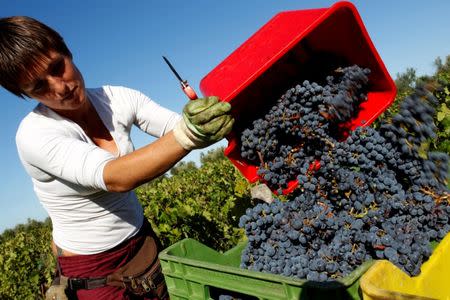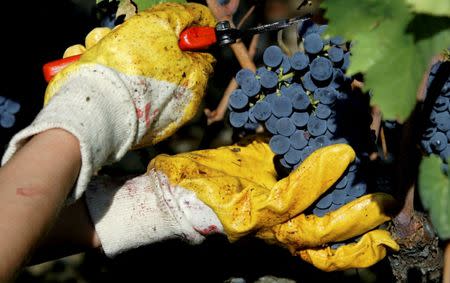Italian winemakers expect less quantity, more quality after extreme weather
By Isla Binnie ROME (Reuters) - Italy's wine producers are already starting to pick grapes under a scorching sun, after a very cold spring and then extreme heat brought forward a harvest expected to be small but perfectly delicious. A prolonged drought which has devastated crops across southern Europe and a frosty start to the year have sent farmers group Confagricoltura's expectations of wine grape production down 15-20 percent in Italy. But the group expects harvests of prosecco, primitivo and pinot grigio to be of great quality, partly thanks to the fact that heat and dryness protect vines from disease and contribute to a greater concentration of nutrients in the fruit. "It is entirely paradoxical," vineyard owner and Confagricoltura official Guido Folonari told Reuters. "Everything bad that could have happened, happened and yet we are heading for good if not excellent quality." Italy is the world's biggest wine producer, and annual turnover in the industry is about 10 billion euros ($12 billion), according to agricultural group Coldiretti. Wine is also the biggest earner among the country's agricultural and food exports, Coldiretti says. Lower production will probably mean higher prices for grapes, but buyers will have to wait until bottled wine hits the shelves in the coming years to see whether those prices also rise, Folonari said. Frost in April prompted vineyard owners in some regions to light bonfires among the vines. French grape growers, who are facing a record low output this year, used similar tactics. "Now we are in the opposite situation, if there were just a light breeze to move the air it would be better," Folonari said. In the northern hills of Franciacorta, grapes were hit so hard by the cold snap that production of the area's prized sparkling wine is likely to drop 30 percent, producer Riccardo Ricci Curbastro said. However, it is still too early to predict how good this year's Franciacorta will be, Ricci Curbastro said, because it is fermented in the bottle and the process takes at least 25 months from the moment of picking. "We are not worried, the weather is favourable and the grapes are healthy," Ricci Curbastro said. "We will only know if it's good and how good after Christmas, when the wines have matured a bit and we can try a glass." (Reporting by Isla Binnie; Editing by Louise Ireland)


